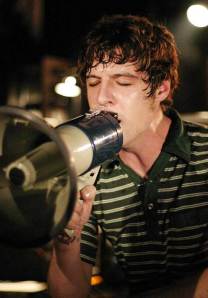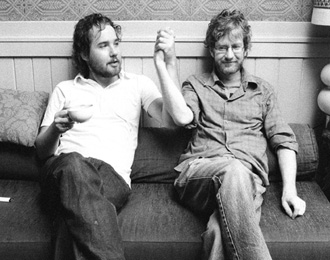 1. The Velvet Teen – Cum Laude! (2006, Slowdance)
1. The Velvet Teen – Cum Laude! (2006, Slowdance)
Everyone knows what it’s like to feel excited, but for years—since I was a kid—I’ve experienced moments of excitement in which I nearly lose control of my body. It’s just for a moment, when I think about something I’m going to do or see or someone I’m going to spend time with, all the usual reasons for excitement. It’s a wave that washes over me, and my whole body trembles. I’ve begun to think it’s a more severe kind of anxious anticipation than is felt by the average person. I was never able to describe it very well, but two of my favorite authors happen to have captured it perfectly.
In Jack Kerouac’s “Belief & Technique for Modern Prose: a List of Essentials” (which I discovered—or was given—in college and which I have since come to hold in such high regard that at one point I toyed with the notion of having its 30 items tattooed somewhere on me so I could never forget them), Kerouac describes anticipatory excitement as “visionary tics shivering in the chest.” That’s how the feeling starts: with something exciting on the horizon, some reminder of why it’s great to be alive, it’s an actual, palpable sensation. But the moment when the excitement overtakes me is something even more powerful (weirdly, it often makes my eyes water and sometimes makes me cough uncontrollably), and I found a kindred spirit in Dave Eggers’s You Shall Know Our Velocity! After making a phone call arranging a particular set of travel plans (you should really read the book), Will, the protagonist, describes his excitement as follows:
“I hung up the phone, jubilant, and threw myself into a wall, then pretended to be getting electrocuted. I do this when I’m very happy.”
That’s it! That’s how it feels! When the wave of excitement becomes overwhelming, I want to respond in a physical way, child-like, something ridiculous and spontaneous and free of any motivation besides wanting to do something physical and ridiculous and spontaneous, because I’m just that excited.
All of this is me getting around to saying that here, in Cum Laude!, is an album that evokes that very feeling in me, recreates it, from beginning to end. It’s the soundtrack to my dizzying, uncontrollable excitement.
The album begins with an electronic howl, followed quickly by Casey Dietz’s spastic drumming. But this is just the beginning, and this is something different. Upon my first listen to this album, years ago, I realized I was experiencing something unlike anything I’d ever heard before. And there’s no hyperbole in that phrase. Nothing sounds like this. And it came out of nowhere. The band’s first full-length, Out of the Fierce Parade, was an incredibly mature set of intricate, emo-inspired indie rock, dripping with pretty piano melodies and lush strings. They followed with Elysium, a departure that found them ditching all electric guitars in favor of even more orchestral piano songs, slow and contemplative or adventurously rambunctious and sometimes overtly political. It’s hard to tell exactly what happened between Elysium and Cum Laude!, but something snapped—in the best way possible. Suddenly here was this manic, explosive set of songs with ADD. That’s where things got interesting.
Objectively, these are the ingredients that comprise Cum Laude!: electronic yelps and Nintendo-esque bleeps and bloops, hyperactive drumming, Judah Nagler’s unreal falsetto fed through a megaphone, layers upon layers of electric guitars and clever bass lines, and a sea of crazy synths and effects-treated pianos.
But it’s something bigger even than all of that. Nagler’s vocal melodies are unusual, but oddly catchy, and with the application of the bullhorn effect—that is to say, Nagler singing through an actual bullhorn, an effect he sometimes recreates at live shows—his voice becomes a different animal, powerful and primal, sometimes howling ferociously. His range is incredible, a voice that doesn’t sound like anyone else. And Dietz is phenomenal, operating on a whole other level than your standard mostly-just-keeping-time drummer. I would go so far as to say he borders on virtuosic. At times it’s incredibly technical drumming, going places where others would get lost. But he also knows when to rein it in, where to ease it down to pensive jazz-style drumming, and it’s that intuition that’s his ultimate strength. The two play well together, Nagler’s voice and Dietz’s Animal drums; a good example where the two collide with that “throw-myself-against-a-wall” excitement is found midway through “Rhodekill,” where the band executes a faux-fall-apart, everything dropping to a halt, then exploding back into action, in perfect time, with Nagler’s enthusiastic “Woo!” (Listen below to hear what the hell I’m talking about.)
What’s really incredible about this album, though, beyond the virtuosic musicianship of the band’s members, is Judah Nagler’s lyrics. They’ve always been clever and interesting, but somewhere between Elysium and this album, Nagler became wise beyond his years. I don’t know if he studied with a guru on a mountaintop, or just went through some fucked-up life changes and came out all the better for it, but out of nowhere here’s this young guy—around 26 years old when the album came out—who’s done some serious figuring it out. These are some of my favorite lyrics of all time; literally every song contains at least a line that sounds, to me, ultra-profound. I’m not kidding when I say that I’ve forged some of my own philosophies about life based on these songs. If you’ll allow me, I’d like to take you on a tour through these incredible words, starting from the beginning and ending with the end, because that’s the way it makes sense to me to do it. And a caveat: it’s entirely possible that I’ve misinterpreted some of these lyrics, but this is what I hear.
The album’s determined opener, “333,” seems to be a song about throwing aside the shallowness of the ego and just getting down to business, making things happen (“I took the greed out of my grin, and sunk my teeth into my work instead”) and about being yourself. “You are the person you’ve been always,” Nagler asserts. “You were just too young to know yourself back then.” It’s a way of saying something I’ve been trying to figure out for years: human beings are at their best when they’re young, when they’re children, and it’s a worthy goal in life to try not to forget that feeling, to recapture it in adult life.
“Flicking Clint” is track number two. As a quick foot-note, a second path of possible exploration, there seems to be a thread of subtle (or sometimes not-so-subtle) and occasionally crude sexual in-jokes running through the length of the album. The album’s title itself, obviously, can be interpreted in a couple of different ways, and if you capitalize all the letters in “Flicking Clint” the words look a bit like “fucking cunt,” if you squint. Then there’s the song “Gyzmkid.” I wouldn’t go so far as to say this is album is “sexually-charged” or anything ridiculous like that, but the topic probably merits more exploration. I’ll save that for another time. As for this song, it appears to be one about pain and sickness, but getting over both. “I’ve known pain,” he sings, “but never as much as on my first day. I don’t care; I do not remember it, and soon I’ll forget this as well.” To me that sounds a bit like a Buddhist meditation on suffering, or the slogan “This too shall pass.” Nagler also drops these incredibly intimate details about personal relationships into the songs, some more than others; I can’t help but smile at the beginning of this song when he sings, “I was on your side as soon as we met.”
“Rhodekill” is the aforementioned hyperactive beast with this slightly perplexing chorus: “Oh foolish, you’re too late! Foolie-coolie, you’re too late, too late.” It’s a song about growing up, that much is apparent. Among its first lines: “I was a child who never wanted to grow up.” Also: “So when I run, I run until dark, so I can’t see the mess I make.” He’s admitting to mistakes he’s made and how he’s been immature, but also looking to the future with an incredible sense of wisdom. “Our love is a fire. It can’t be controlled. Sometimes you’ve got to go slow.” But the song’s most climactic moment offers these brilliant few lines, fit to be repeated, like a mantra: “It’s where you are, not where you’re going, not where you’re from. You’re what you love, and that is all.” Brilliant! This in-the-moment spirit pops up all over the album. There’s more to come.
“False Profits” is arguably the album’s most straight-forward song, and easily its slowest. An acoustic guitar is prominent in this one, but over the top floats a stretched-out synth lead, following the guitar’s melody. Nagler’s voice is doubled, through the whole song, by breathy female vocals, whose harmonies are hard to ignore. When I sing this song in my head, I hear Nagler’s voice, but singing her higher parts. This one is a love song, there’s no doubt about that, but there’s some definite political commentary in here as well, and that’s hard to do. Ruminate on this:
“I tried to speak up, but I was cornered with a fool’s dunce cap. Yeah, I may be dumb, but I still have ears to listen. And I heard a rumor: you made a killing with the school budget, taxing the people from which you already profit. So where does it end? Go waste your time. It is hollow. My love, you don’t have to wallow in your sorrow. My love, you don’t have to steal or borrow. Go waste your time.”
It seems to be a critique of the unnecessarily political higher education system, and how you don’t have to be educated to be smart or to be happy, but I could be way off on that one. Anyway, it’s a subject I don’t think I’ve ever seen tackled in song before, and in that way the song is humbling.
Then: “Tokyoto.” Seizure-inducing hyperactive madness (and that’s not even taking into account that video)! Try to keep up! This song is one of the album’s more difficult to interpret, but from an imagistic standpoint it’s incredible: the vague, imaginative description of the speaker (“Oh, I was born a spark, and I burned, burned myself a watermark. I left myself a trail, to find my way when I fell astray”) contrasted with his impossible-to-be-misunderstood declarations (“Oh, I know I am going home, but I don’t know when”). I submit that this one is meant to be felt.
And we’ve come now to one of my favorites on the album, and, as it happens, one of my all-time favorite songs: “Noi Boi.” Remember that episode of The Adventures of Pete & Pete when the younger Pete hears the band rehearsing in the garage (the band being Polaris, playing “Summerbaby”) and realizes he’s heard his favorite song? When I first heard “Noi Boi,” that’s kind of how I felt. Just floored by it. This one is packed with incredibly wise insights about the nature of relationships, and, magically, it seems to espouse just exactly some of my life philosophies. “If we die tonight I do not care,” goes the incredibly catchy chorus. “There will not be a me to be scared. And if we do not make it, I don’t mind. All I want is to sleep by your side. Too many people live imprisoned, stuck somewhere between the ‘is’ and the ‘isn’t.’ The night will pass and we’ll no longer think on what it was or what it wasn’t.” Again, there’s the living-in-the-moment attitude, the acknowledgment that people get bogged down with trivial matters, worrying about what’s past and what could be, instead of just enjoying life how it is. He goes on to sing my favorite verse: “I may never win this race; I may never have money on me. It all seems a lottery anyway. Got a job that pays my rent, and I can take you out now and then. It’s all about the time we spend together anyway.” So simple! So perfect! That’s how I want to live. There’s an emphasis there on what’s really important. It’s not about making money or climbing the corporate ladder or owning lots of things; it’s about people. It’s all about people. Life is impermanent, the self is impermanent, so people—right here, right now—are all we have. Fuck, man. This song gets me.
“Spin the Wink” is a magical, spritely song, big and soaring and triumphant. “I will make you turn my way,” sings a confident Nagler, “and do it all on purpose. Too many chances have passed me already.” It’s a song about carpe-ing the diem. After a break in the middle that sounds like a futuristic sitar (which I think is actually just a treated piano) and Nagler crying out, “Oh, give me your hand,” the song explodes back into the most triumphant thing you’ve ever heard. “Darling, let your fate come call on you. When you’re not here, you won’t forget what you are to me, and we’ll spend the week not sparing a wink. Say what you want to me.”
Following that is “Bloom,” in which nearly every line, after its cleverly symbolic opening, seems like—and is—good advice. “‘Oh, how I long to get my feet wet!’ cried and yelled the ice as it melted. ‘But will I know it when I see it? Or will I miss the only chance I ever had?'” Then, more of the time-is-fleeting-so-enjoy-each-moment philosophy: “No calendar can keep a secret. Time will tell, yes, time will tell. And this moment, you can keep it only for a while, and it will go, but you’ll be thankful—”
—and then here comes the single best piece of advice on the album, something I think about every day—(how did he get so smart?!)—
“—that you are not only judged by your messes, and not every word you say embarrasses. Not every wound received needs caresses. Some lessons are best learned through having less, and listening. So listen! Listen!”
It goes on with even more brilliant insight, but I should leave some of this for you to discover. Just know: the last two stanzas of the song are equally as enlightened.
Then: “Building a Whale,” another crazy, spastic song, with impossibly quick, tight, turn-on-a-dime drumming. Casey Dietz, you are a madman. There seems to be more wordplay at work here; at one point he definitely sings, “Hear my girlfriend cum loud,” and every time he sings “well” it also sounds like “whale.” It seems to be a song about jealously, about a girlfriend who’s been unfaithful. You can hear the anger in the song. But it’s intelligent anger. “So? Well?” It’s like an interrogation. “Is there a lie that you will not tell? There’s no reversing the spell of ‘If you don’t, who will?'” That last line is constantly caught in my head, and I’m still trying to figure out exactly what it means.
“In a Steadman Spray” is another song that sounds determined to make something happen. It’s a song about the way life marches on, whether you like it or not. It’s about the music industry (“forefinger blackened in song,” about playing guitar), about Nagler’s and the band’s participation in it, among other things: “They will say what they will say, but I’ve worked as hard as anyone else. Got the same fire in these veins: copper cords, yeah, electric tape.” There’s a certain ennui, a world-weariness in its lyrics (“Chains and tires till you can’t sleep, and all this to someday never wake up. And it never ends. No, it never ends”), and it describes the kind of helpless feeling that often besets modern youth (“It just hits harder every day, and the corporate hands tighten their grasp. How can I say anything? Got no funds, no representation”). There’s even a snarky condemnation of a shallow subculture, a bourgie affectation among his—our—generation (“Oh, the wait this year for the new Sundance independent films: oh, it never ends”). Similar in its political scope to “Chimera Obscurant,” the 12-minute epic from Elysium, “Steadman Spray” finds Nagler at the end of his tether (“Have we all gone to Tourette’s? … Oh, the world’s gone mad. Can you feel it now?”). But ultimately it’s a search for something below the surface, something better, and a reminder of what it is that’s really ours: “They can’t steal your suffering. They can’t steal your memories.”
I’m getting so worked up about all this. Goddamn, I love this album. Two more to go.
In contrast to the raging-against-the-machine that is “Steadman Spray,” “Around the Roller Rink” is a masterfully-executed love song, the most innocent and wide-eyed and optimistic the album has to offer. I love everything about this song: the buzzy, playful intro, leading into the body of the song with a “ding!” like the sound of an elevator arriving at your floor; the noisy chorus with little glitchy flourishes; the rollicking, adventurous, guitar-heavy passage that dominates the song’s second half; and, of course, the lyrics. “Surely I would pass away if I let you go,” Nagler says plaintively, his voice humming beautifully through the bullhorn. And what follows, through a simple metaphor, is an incredibly charming, disarmingly earnest oath of romantic dedication: “And though the dance is as slow as sleep, and I don’t know whether I follow or lead, it’s the best thing that could ever be just to hold your hand and waltz around the roller rink.”
Speechless. Every time.
And finally, “Gyzmkid.” This is the song I play for people when I want to knock them on their ass. The drums pound furiously at the beginning, a fret slide beckons an eyes-narrowed, “let’s fucking do this” guitar line, and there’s Judah, asking, “Have you made your peace with fate? Have you resolved all those hated mistakes?” The whole first verse is him asking questions, questions that expose doubt and insecurity (“Do the things you desire let you remember what you wanted them for? When you’ve finally laid your claim, do you find that you just search all the more?”). But then it’s all immediately turned on its head: “Well, not me, ’cause I’ve got you, and you’re all I could ever want in this eternal moment!” The chorus is huge, a blast of guitars and synth and light-speed drumming, and this is that feeling, in a nutshell: pure, blissful, out-of-my-fucking-mind excitement. This is music that makes me feel excited to be alive. The album’s last line says everything all at once: “Trust yourself and the one that you love!”
And then it’s just about over. Drums pound under weird sound effects, and when they drop out, it’s a beautifully human moment: the sound of people (presumably, the members of the band) playing tug-of-war with a dog, laughing.
Things tie themselves together in strange ways. Before I’d necessarily made the overt connection between this album and that indescribable feeling, I wrote a song for Old Radio, a song about that kind of excitement, a song that also ended up referencing The Velvet Teen. Twice in the song (its title, “Naked Girl Part Two,” itself a reference to an older Velvet Teen song), I try to describe the feeling. “You put the birds in my chest,” I sing early in the song, about that fluttering excitement, kind of like butterflies in the stomach, but more intense; later, I sing about “stumbling, coughing hard, excited, nervous shivers down my spine.” I tried to capture that feeling, tried to describe what it feels like in the moment. But I’ve said it before and I’ll say it again now—words aren’t really doing the source material justice. As with all great albums, you just have to listen for yourself. So listen! Listen!
Click below to listen to “Rhodekill,” and make sure you have a wall nearby that you can throw yourself against.



















